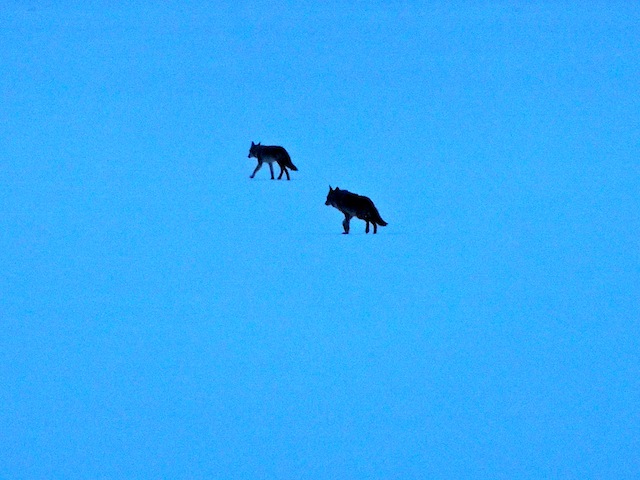The War on Wolves
This winter, my husband, Michael Sather, and I saw three wolves cross the frozen lake in front of our cabin in the Cariboo. It was one of those special moments when time stands still, when you are grateful to witness something rare and beautiful. At the same time, the BC government had begun another chapter in their war on wolves. The guest post below is by Michael Sather.
When I was a biologist I was employed by the Canadian Wildlife Service to study wolves and, in my nine years as a wilderness tourism guide, I had a number of experiences with wolves. When I read about the talk of the BC Government mounting a bigger wolf kill program in the province (See Andrew McLeod’s article on this issue in the Tyee), I had to voice my opposition, particularly in light of the letter the BC Trappers wrote to the government. The letter states that the Trappers Association does not agree with the killing of lactating female wolves, which leaves the pups to die of starvation. The trappers stated that this practice doesn’t conform with international standards for humane trapping.
You may wonder how trappers or government can separating lactating females from any other wolves. The simple answer is they can’t. They should not allow the killing of wolves during the denning and early rearing period (May to the end of July).
BC government Minister Steve Thomson says we’re not going back to poisoning wolves (an excruciation death). It’s unbelievable that they were even considering it and they were. It’s apparent though that the government is still aiming at wolf hunting seasons and government wolf kills during the denning and post denning period. Also, they’re looking at a year round hunting season on wolves of any age. This makes it legal to kill pups, even those in the den. This is a disgusting excuse for wildlife management. The animal rights people should be all over this and hopefully they will be.
So, a double barrelled assault on wolves: a year round killing season and allowing the killing of pups of any age. These guys have no shame. I hope this issue is vigorously discussed in the BC Legislature. I am also hopeful we won’t use the word “cull” when discussing wolf kills. “Cull” implies an overabundance of wolves. This is unlikely to be the case in terms of the natural predator-prey relationship. For further information google Paul Paquet, wolf biologist.
Wolves probably are having a negative effect on some caribou herds at risk. The government kills wolves now to deal with this situation. What the Province is actually responding to with their current plan is primarily upset ranchers and some hunters.
Many British Columbians probably don’t know that ranchers’ cattle are oftentimes right out in the forest where the wolves are, particularly in the Cariboo and Chilcotin. I’m always amazed that the cattle survive as well as they do. For example, I saw seven horn-less steers and/or heifers out on the range and in the forest on their own in January this year in the Cariboo. There is a wolf pack in the area yet is seems the cattle had suffered little or no predation, given the number of them that I was advised by locals, are in this particular group. It is not uncommon for ranchers or other range cattle owners to be unable to round up all their cattle in the fall. These animals would be at a higher risk of predation by wolves.
The war on wolves needs to be stopped. Wolves improve ecosystems by reducing the number of moose, deer and elk, thereby maintaining valuable forests and increasing the diversity of other animals such as birds.
For a further explanation of this phenomenon google ‘trophic cascades’ or watch the powerful utube short film “How Wolves Change Rivers.” http://www.filmsforaction.org/watch/how-wolves-change-rivers/#.UwEHtAcFuAA.facebook

